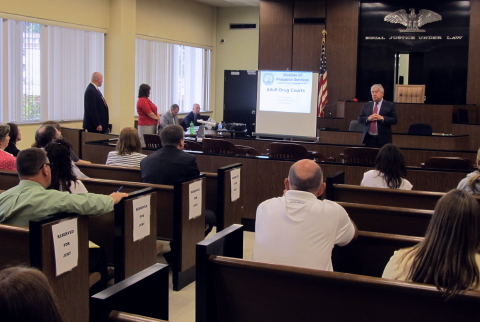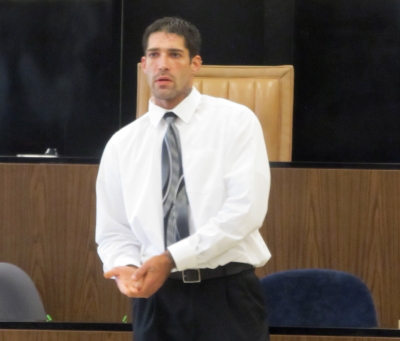DRUG COURT PROGRAM OFFERS HOPE TO ADDICTS - Regional Counties Looking At Implementing, Calhoun Officials Attend Presentation

Judge David W. Nibert welcomes county
officials to Drug Court presentation
About 40 officials from Calhoun and Roane County participated in a program Thursday in Spencer, a presentation regarding the establishment of drug court.
Twenty-two West Virginia counties have yet to establish the system.
The Calhoun Commission will be looking at the program.
Most of Calhoun's elected officials attended the meeting with prosecutor Shannon Johnson, who supports the program, including Calhoun Commissioners Chip Westfall and Bob Weaver, Sheriff Carl Ballengee, Calhoun Circuit Clerk Shelia Garretson, County Clerk Jean Simers, and representatives from Calhoun Magistrate Court, among others.
Studies show Drug Courts accomplished a reduction in recidivism and substance abuse among offenders, increase the likelihood of successful rehabilitation, as opposed to continuous incarceration.
The Court program has intense treatment, mandatory drug testing, community supervision, sanctions and incentives supervised by a judicial officer.
Drug court officials say the program reduces crime, saves money, ensures compliance and most importantly restores families and citizens.
Perhaps the most important part of the presentation was hearing personal success stories of individuals who are now sober and clean as a result of the program.

Graduate of Drug Court program shares his fall into addiction
Brandon, a former Marshal University straight-A student who committed crimes, made the point that addiction can affect any person, status or station in life, dispelling a common belief that it is just "low-class hoodlums" who become addicts and alcoholics.
He related his compelling life story of sliding into addiction, and the pain and suffering it cost him, his family and community.
Addiction specialists say the disease often genetically runs in families and is connected to a specific brain chemistry dynamic, learned behavior, and physical addiction to the substance, with criminal activity driven by people under the influence, the need to obtain money (stealing) to get the next fix or drink and poverty.
In West Virginia, corrections officials say over 80% of incarcerations are linked to drug and alcohol problems.